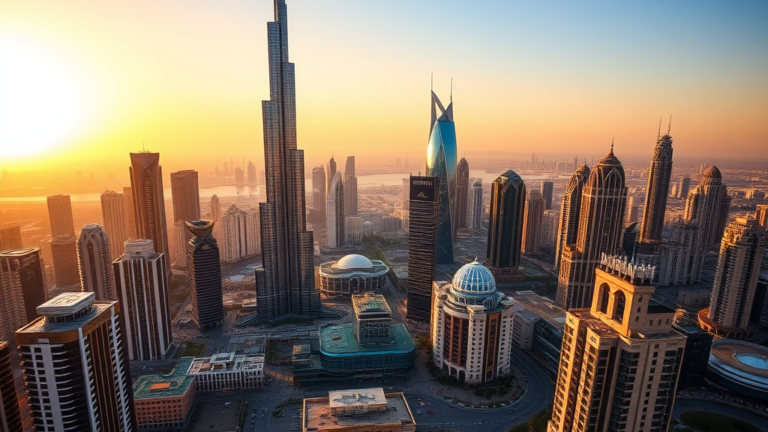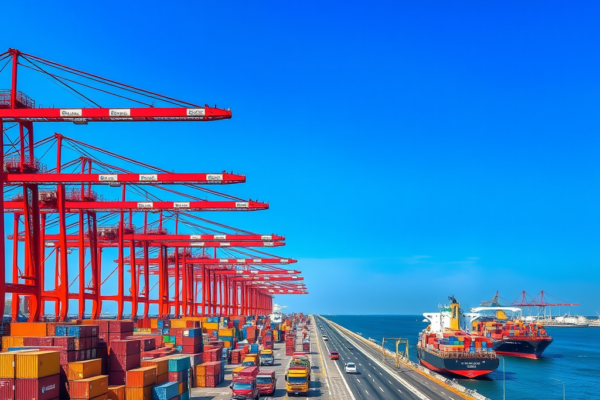In a world increasingly defined by economic interconnectedness, few cities can rival Dubai’s rapid ascent as a global financial hub. Nestled between Europe, Asia, and Africa, this vibrant metropolis has transformed its landscape to support a robust and diversified economy. Historically a fishing village, Dubai leveraged its strategic position and burgeoning oil wealth to pivot into one of the world’s most promising financial centers. It has successfully attracted international businesses across various sectors, creating an environment ripe for innovation and investment. As a result, Dubai now stands as a symbol of modernity and financial prowess, drawing entrepreneurs and investors from every corner of the globe.
The magic of Dubai’s evolution lies in a combination of proactive governance, investment in infrastructure, and a commitment to creating a welcoming business environment. The city’s leadership recognized the need to diversify the economy early on, focusing not merely on oil but on creating a sustainable framework for growth. This vision carved out a path leading to state-of-the-art facilities, world-class education, and regulatory frameworks designed to simplify business operations. It is this strategic foresight, coupled with unwavering determination, that has positioned Dubai as an unparalleled player on the global financial stage.
Historical Context

Dubai’s journey from a modest trading port to a global financial powerhouse is a fascinating story that began in the early 20th century. Initially, the economy revolved around fishing and pearling, with little indication of the prosperity that lay ahead. The discovery of oil in the late 1960s marked a pivotal moment, leading to transformative investments in infrastructure and services. This wealth enabled the city to invest heavily in education, technology, and business sectors, paving the way for rapid economic development. These investments expanded Dubai’s horizontal and vertical boundaries, creating an urban landscape rich with potential.
Strategic Location

The geographical positioning of Dubai is one of the key elements that has facilitated its growth as a financial hub. Strategically located at the crossroads of Europe, Asia, and Africa, Dubai offers unparalleled access to major global markets, thus enabling businesses to operate in various time zones. This advantageous location is not merely geographic; it translates into significant business efficiencies for companies that set up shop in the city. The ease of accessibility has drawn in multinational corporations and expatriates, eager to tap into the burgeoning market.
- Proximity to major international cities like London, Hong Kong, and New Delhi
- Excellent connectivity through Emirates Airlines and several other carriers
- Time zone advantage for trading and business operations
Robust Infrastructure
Dubai’s commitment to developing its infrastructure has played a crucial role in its rise as a financial center. Over the years, significant investments have been made to enhance transport, telecommunications, and urban development. The creation of highly advanced ports, like Jebel Ali Port, and world-class airports has facilitated the seamless movement of goods and people. These infrastructures do not merely support existing businesses; they attract new enterprises, investors, and a talented workforce eager to participate in Dubai’s growth story. The city’s skyline, adorned with iconic structures, serves as a testament to its ambition and modernity.
| Infrastructure Elements | Description |
|---|---|
| Dubai International Airport | One of the world’s busiest airports, facilitating millions of passengers annually. |
| Jebel Ali Port | The largest and busiest port in the Middle East, critical for trade. |
| Metro System | World-class urban transit network enhancing local mobility. |
Business-Friendly Environment
Dubai’s regulatory framework and business environment are designed to attract international investment. Through the establishment of numerous free zones, the city has created a conducive atmosphere for foreign businesses to thrive. These free zones are specially designated areas that offer incentives such as full foreign ownership, repatriation of profits, and exemptions from import duties. This regulatory ease makes Dubai an excellent choice for start-ups and established companies looking to expand their footprint in the Middle East. The government’s proactive approach encourages innovation and fosters a culture of entrepreneurship.
- 100% foreign ownership in designated free zones
- Zero corporate or income taxes, attracting a myriad of businesses
- No currency restrictions or limitations on profit repatriation
Financial Services Sector
The development of a strong financial services sector is integral to Dubai’s status as a global financial hub. The presence of a variety of banking institutions, asset management firms, and investment advisory companies creates a diversified financial environment. This robust financial services ecosystem is designed to cater to both local and international clients, integrating comprehensive services under one umbrella. Prominent events like the Dubai International Financial Centre (DIFC) attract businesses that seek to leverage Dubai’s strategic location and generous economic benefits. With each passing year, Dubai’s financial district continues to flourish, solidifying its place as a focal point for global finance.
- Diverse range of financial institutions catering to varied client needs
- Investment opportunities spanning real estate, technology, and tourism sectors
- Thriving capital market with both regional and international listings
Innovation and Technology
The emphasis on innovation and technology has positioned Dubai at the forefront of the financial industry. Dynamic start-ups in fintech and proptech have found a nurturing haven in Dubai, benefitting from the supportive ecosystem that surrounds them. Notably, the drive toward digital transformation has compelled established banks and financial institutions to innovate their service offerings. These advancements include the adoption of blockchain technology, AI, and machine learning, which streamline operations and enhance customer experience. The continuous push for innovation illustrates Dubai’s commitment to not just keeping pace, but leading the charge in the financial sector.
- Increased focus on fintech startups providing innovative solutions
- Integration of blockchain technology to secure transactions
- Digital banking models catering to an increasingly tech-savvy client base
Conclusion
Dubai’s evolution into a global financial hub is a testament to its strategic foresight and adaptability. By focusing on infrastructure, a welcoming business environment, and innovation, Dubai has successfully carved its niche in the competitive landscape of international finance. With ongoing efforts to solidify its position through digital transformation and regulatory advancements, the future looks promising. As the world shifts toward an increasingly integrated economy, Dubai is poised to remain a pivotal player on the global stage. This continuous evolution will undoubtedly inspire other cities aiming to reach similar heights in the financial landscape.
Frequently Asked Questions
What factors contributed to Dubai’s emergence as a financial hub?
- Strategic location at a global crossroads
- Development of robust infrastructure
- Introduction of business-friendly policies and free zones
How does Dubai’s tax system benefit businesses?
- Dubai offers 0% income tax for most companies
- No capital gains tax, attracting international investors
Are there unique investment opportunities in Dubai?
- Yes, Dubai’s free zones offer various incentives for investors
- Opportunities in sectors like real estate, technology, and tourism
What role does technology play in Dubai’s financial sector?
- Emphasis on fintech innovation and digital banking solutions
- Adoption of blockchain technology for increased security and efficiency
How has Dubai improved its global business reputation?
- Hosting international conferences and events
- Building a strong regulatory framework that promotes transparency and trust




